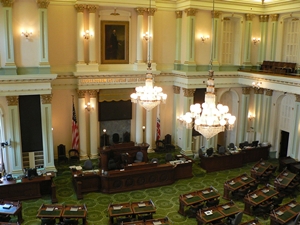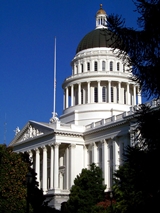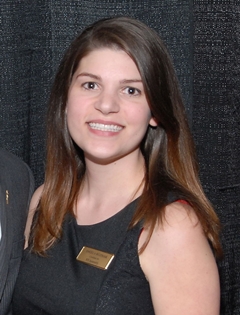September 17, 2015 •
San Diego, CA Raises Lobbyist Fees
On September 15, the San Diego, California City Council voted unanimously to raise the registration fees for lobbyists. The new ordinance, which was approved by the Budget Committee in July, increases the annual registration from $40 to $150. Annual registration […]
 On September 15, the San Diego, California City Council voted unanimously to raise the registration fees for lobbyists. The new ordinance, which was approved by the Budget Committee in July, increases the annual registration from $40 to $150. Annual registration fees paid by clients who hire lobbyists also increases from $15 to $30. These increases are the first since the enactment of lobbyist registration fees in 2008. The changes take effect January 1, 2016.
On September 15, the San Diego, California City Council voted unanimously to raise the registration fees for lobbyists. The new ordinance, which was approved by the Budget Committee in July, increases the annual registration from $40 to $150. Annual registration fees paid by clients who hire lobbyists also increases from $15 to $30. These increases are the first since the enactment of lobbyist registration fees in 2008. The changes take effect January 1, 2016.
September 17, 2015 •
Thursday News Roundup
Lobbying Kansas: “Lobbyist Lunches Rankle KanCare Critics” by Andy Marso for KCUR South Carolina: “Ethics Board: It’s legal for Haley to get season tickets” by Seanna Adcox (Associated Press) for Kitsap Sun Campaign Finance “Can Anything Be Done About All […]
 Lobbying
Lobbying
Kansas: “Lobbyist Lunches Rankle KanCare Critics” by Andy Marso for KCUR
South Carolina: “Ethics Board: It’s legal for Haley to get season tickets” by Seanna Adcox (Associated Press) for Kitsap Sun
Campaign Finance
“Can Anything Be Done About All the Money in Politics?” by Thomas Edsall for New York Times
“Why Clinton’s Big Campaign Finance Proposal Could Lead to More Partisan Gridlock” by Max Ehrenfreund for Washington Post
“Donald Trump Is Target of Conservative Ad Campaign” by Nicholas Confessore and Alan Rappeport for New York Times
Ethics
“Across the Globe, a Growing Disillusionment with Democracy” by Roberto Foa and Yascha Mounk for New York Times
Alabama: “Legal Defense Bill Draws Alabama Ethics Commission Fire” by Brian Lyman for Montgomery Advertiser
California: “Sacramento City Council Approves Ethics Package” by Cathy Locke for Sacramento Bee
Maryland: “County Ethics Commission to Grow, Get More Power under Proposed Bill” by Jen Fifield for Frederick News Post
Pennsylvania: “‘This Is Just Aggressive Government,’ Lawyer Says as Ex-Mayor Reed’s Corruption Case Goes to County Court” by Matt Miller for Harrisburg Patriot-News
September 16, 2015 •
Wednesday Government Relations News
Lobbying Arizona: “Second Arizona Corporation Commissioner Regulator Found to Be Lobbyist” by Ryan Randazzo for Arizona Republic California: “San Diego Lobbyist Fee Nearly Quadruples” by David Garrick for San Diego Union-Tribune Campaign Finance “Twitter Offers New Cash Stream for Presidential […]
 Lobbying
Lobbying
Arizona: “Second Arizona Corporation Commissioner Regulator Found to Be Lobbyist” by Ryan Randazzo for Arizona Republic
California: “San Diego Lobbyist Fee Nearly Quadruples” by David Garrick for San Diego Union-Tribune
Campaign Finance
“Twitter Offers New Cash Stream for Presidential Candidates” by Julie Bykowicz (Associated Press) for Philadelphia Inquirer
“Democrats Seek to Expand Use of ‘Super PACs’” by Nicholas Confessore for New York Times
Ethics
“Statehouse Sex Scandals Carry Public Costs, Consequences” by David Lieb (Associated Press) for Charlotte Observer
Florida: “Florida Ethics Commission Balks at Forcing Spouses of Elected Officials to Reveal Finances” by Steve Bousquet for Tampa Bay Times
Minnesota:”Lawmakers Accused of ‘Making Out’ in Park Apologize for Calling Ranger a Liar” by David Montgomery and Rachel Stassen-Berger for St. Paul Pioneer Press
New York: “Leaders of Moreland Commission Panel Felt Cuomo Intervened, Prosecutors Say” by Benjamin Weiser, Thomas Kaplan, and Susanne Craig for New York Times
New York: “William Scarborough, Ex-New York Assemblyman, Is Sentenced to 13 Months” by The Associated Press for New York Times
Wisconsin: “Knudson on GAB: ‘We need to take this thing apart’” by M.D. Kittle for Wisconsin Watchdog
September 15, 2015 •
Tuesday Lobbying and Campaign Finance News Update
Lobbying “Lobbyist Finds a Quiet Place to Work, as a Six-Figure U.S. Government Contractor” by Eric Lipton for New York Times California: “Number of California Lobbyists Grows over Past Decade” by Jim Miller for Sacramento Bee Florida: “Lobbyist Miscues Laid […]
 Lobbying
Lobbying
“Lobbyist Finds a Quiet Place to Work, as a Six-Figure U.S. Government Contractor” by Eric Lipton for New York Times
California: “Number of California Lobbyists Grows over Past Decade” by Jim Miller for Sacramento Bee
Florida: “Lobbyist Miscues Laid Out in Legislative Report” by Brandon Larrabee (News Service of Florida) for Sarasota Herald-Tribune
Missouri: “Man Fined for Not Registering as Lobbyist” by Summer Ballentine (Associated Press) for Waynesville Daily Guide
Ethics
Alabama: “Mike Hubbard Says Alabama Ethics Law He Fought For Is Unconstitutionally Vague” by The Associated Press for AL.com
Illinois: “Jury Finds Lake Station Mayor, Wife Guilty in Federal Trial” by Teresa Auch Schultz for Chicago Tribune
New York: “Who’s Paying Assemblyman’s Auto Bills?” by Chris Bragg for Albany Times Union
Elections
“Perry Suspends Campaign after Hopes for a ‘Second Chance’ Were Dashed” by David Weigel, Philip Rucker, and Dan Balz for Washington Post
Procurement
“Federal Contractors Tell Obama: Stop picking on us” by Lydia Wheeler for The Hill
Redistricting
“New Political Map-Making Push Gains Ground, Concerns” by Rick Pearson for Chicago Tribune
September 14, 2015 •
Monday News Roundup
Lobbying Hawaii: “Lawsuit Seeks New City Council Votes on Honolulu Rail” by Nick Grube for Honolulu Civil Beat Missouri: “Report: Lobbyist goodies for Missouri lawmakers topped $10M over past decade” by Kevin McDermott for St. Louis Post-Dispatch Campaign Finance California: […]
 Lobbying
Lobbying
Hawaii: “Lawsuit Seeks New City Council Votes on Honolulu Rail” by Nick Grube for Honolulu Civil Beat
Missouri: “Report: Lobbyist goodies for Missouri lawmakers topped $10M over past decade” by Kevin McDermott for St. Louis Post-Dispatch
Campaign Finance
California: “San Jose Commission Will Investigate Nearly the Entire City Council” by Ramona Giwargis for San Jose Mercury News
Montana: “Group Suing over Election Laws Seeks to Avoid Disclosures” by Matt Volz (Associated Press) for The Missoulian
Pennsylvania: “Allentown Mayor Ed Pawlowski Implicated in FBI Probe” by Emily Opilo and Scott Kraus for Allentown Morning Call
Ethics
“GOP Consultant Admits Lying to Ethics Investigators” by Paul Singer for USA Today
California: “Carson Mayor under Investigation for Not Filing Disclosure Reports with the State” by Nathan Fenno, Paul Pringle, and Richard Winton for Los Angeles Times
Indiana: “BMV Vendor Fires 2 Employees amid Ethics Probe” by Tony Cook for Indianapolis Star
Michigan: “House Expels Gamrat; Courser Resigns Before Vote” by Chad Livengood for Detroit News
New Mexico: “Impeachment Is ‘As Heavy As It Gets’” by Deborah Baker for Albuquerque Journal
Legislative Issues
“Boehner’s Future as Speaker in Doubt” by Jake Sherman and John Bresnahan for Politico
September 14, 2015 •
California Legislature Adjourns Regular Session
On September 11, the California State Legislature adjourned its regular session sine die. Before adjourning, the legislature sent several ethics bills to the Gov. Jerry Brown, including Assembly Bill 10, which contains provisions affecting elected officials’ disclosure of financial investments […]
 On September 11, the California State Legislature adjourned its regular session sine die.
On September 11, the California State Legislature adjourned its regular session sine die.
Before adjourning, the legislature sent several ethics bills to the Gov. Jerry Brown, including Assembly Bill 10, which contains provisions affecting elected officials’ disclosure of financial investments and conflicts of interest. Another bill, Assembly Bill 990, will require political advertisements to carry larger statements clearly stating information about who is paying for the advertisement. Brown has until October 11 to sign or veto legislation. The governor does not have a pocket veto.
A special legislative session, which began on June 26, 2015 and has been running concurrently with the regular session, remains in session.
Photo of the California State Assembly chamber by David.Monniaux on Wikimedia Commons.
September 11, 2015 •
California Bill Requires New Disclaimer Rules for Political Ads
The Legislature has passed a bill requiring new political advertising standards. Sponsored by Assemblywoman Susan Bonilla, Assembly Bill 990 will require political advertisements to carry larger statements clearly stating information about who is paying for the advertisement. Bonilla introduced the […]
 The Legislature has passed a bill requiring new political advertising standards.
The Legislature has passed a bill requiring new political advertising standards.
Sponsored by Assemblywoman Susan Bonilla, Assembly Bill 990 will require political advertisements to carry larger statements clearly stating information about who is paying for the advertisement.
Bonilla introduced the legislation to ensure voters will be able to easily identify the sponsors behind any political advertising.
September 11, 2015 •
Bill Changes Disclosure Thresholds for California Public Officials
The State Assembly has passed Assembly Bill 10 and sent it to the governor. This bill contains provisions affecting elected officials’ disclosure of financial investments and conflicts of interest. It requires public officials to provide more detailed information about their […]
 The State Assembly has passed Assembly Bill 10 and sent it to the governor.
The State Assembly has passed Assembly Bill 10 and sent it to the governor.
This bill contains provisions affecting elected officials’ disclosure of financial investments and conflicts of interest. It requires public officials to provide more detailed information about their business dealings and investments.
It also raises the thresholds used to decide if an official’s investments create a conflict of interest.
AB 10 is linked to Senate Bill 21, which also passed and has been sent to the governor. In order for these bills to become law, both must be signed.
Photo of the California State Capitol by Nikopoley on Wikimedia Commons.
September 11, 2015 •
Recall Campaign to Continue in Oregon
The Oregon Office of the Secretary of State has ruled a recall campaign against state Sen. Floyd Prozanski did not violate election law to collect the signatures it turned in. This ruling means the recall effort will be able to […]
 The Oregon Office of the Secretary of State has ruled a recall campaign against state Sen. Floyd Prozanski did not violate election law to collect the signatures it turned in.
The Oregon Office of the Secretary of State has ruled a recall campaign against state Sen. Floyd Prozanski did not violate election law to collect the signatures it turned in.
This ruling means the recall effort will be able to continue.
The secretary of state has until Monday to check the 10,027 signatures collected. In order for a recall election to be called, there need to be 8,415 valid signatures from voters in the senator’s district.
If there are enough valid signatures, the election would have to be held before October 23.
September 11, 2015 •
New York State Rep. Under Investigation by Ethics Panel
State Rep. Angela Wozniak is being investigated by the Assembly Ethics Commission following claims of sexual harassment. A male member of her staff made the complaint against her. Wozniak’s attorney, Steven Cohen, would make no comment beyond stating the representative […]
 State Rep. Angela Wozniak is being investigated by the Assembly Ethics Commission following claims of sexual harassment.
State Rep. Angela Wozniak is being investigated by the Assembly Ethics Commission following claims of sexual harassment.
A male member of her staff made the complaint against her.
Wozniak’s attorney, Steven Cohen, would make no comment beyond stating the representative is cooperating with the ethics panel and fully expects her to be exonerated.
Photo of Rep. Angela Wozniak by KittyHawk2015 on Wikimedia Commons.
September 11, 2015 •
Sacramento, CA City Council to Vote on Ethics Proposals
On September 15, the Sacramento, California City Council will vote to determine whether to create an ethics commission with a new ethics code. An office of compliance would also be created for city employee training of local and state ethics […]
 On September 15, the Sacramento, California City Council will vote to determine whether to create an ethics commission with a new ethics code. An office of compliance would also be created for city employee training of local and state ethics laws. Additionally, if the legislation is passed, a redistricting commission would be created to draw new boundaries for City Council districts.
On September 15, the Sacramento, California City Council will vote to determine whether to create an ethics commission with a new ethics code. An office of compliance would also be created for city employee training of local and state ethics laws. Additionally, if the legislation is passed, a redistricting commission would be created to draw new boundaries for City Council districts.
Mayor Kevin Johnson said the proposals are “a breakthrough that provides an unprecedented level of accountability and transparency to Sacramento city government,” according to the Sacramento Bee.
September 11, 2015 •
California Bill Requiring Disclosure of Government Officials’ Travel Sent to Governor
On September 10, a bill requiring disclosure of funding for California government officials’ travel was sent by the Legislature to the Governor. Senate Bill 21 requires a nonprofit organization paying for the actual costs of travel for an elected state […]
 On September 10, a bill requiring disclosure of funding for California government officials’ travel was sent by the Legislature to the Governor. Senate Bill 21 requires a nonprofit organization paying for the actual costs of travel for an elected state officer or local elected officeholder to disclose the names of donors responsible for funding the payments. The legislation also requires a person who receives a gift of a travel payment from any source to report the travel destination on his or her statement of economic interests.
On September 10, a bill requiring disclosure of funding for California government officials’ travel was sent by the Legislature to the Governor. Senate Bill 21 requires a nonprofit organization paying for the actual costs of travel for an elected state officer or local elected officeholder to disclose the names of donors responsible for funding the payments. The legislation also requires a person who receives a gift of a travel payment from any source to report the travel destination on his or her statement of economic interests.
September 11, 2015 •
News You Can Use Digest – September 11, 2015
National: Data Scientists Create a Tool That Tracks the Influence of Lobbying Groups on Legislation Chicago Inno – Karis Hustad | Published: 9/8/2015 Though it is common practice, it is hard to track how often the language used in laws – […]

National:
Data Scientists Create a Tool That Tracks the Influence of Lobbying Groups on Legislation
Chicago Inno – Karis Hustad | Published: 9/8/2015
Though it is common practice, it is hard to track how often the language used in laws – particularly controversial ones – can come from lobbying groups, given the vast amounts of information that would need to be analyzed across 50 states. Now, the University of Chicago’s Data Science For Social Good created a tool that will launch later this year that can match legislation across state lines, offering journalists, researchers, and watchdogs an efficient way to track lobbyists’ influence. “I don’t think people are aware of when [lawmakers] do this and why,” said Matt Burgess, a doctoral student and one of the fellows on the project. “No one has been able to study at large scale how this copying happens. Legislators … know the process but no one from the outside can look in at how this diffusion happens in states over time.”
Food Industry Enlisted Academics in G.M.O. Lobbying War, Emails Show
New York Times – Eric Lipton | Published: 9/5/2015
Monsanto executives were worried about attacks on the safety of their genetically modified seeds. So Monsanto and its industry partners retooled their lobbying and public relations strategy to spotlight a rarefied group of advocates: academics, brought in for the gloss of impartiality and weight of authority that come with a professor’s pedigree. Emails obtained by The New York Times provide a rare view into the strategy and tactics of a lobbying campaign that has transformed ivory tower elites into powerful players. The use of third-party scientists, and their supposedly unbiased research, helps explain why the American public is often confused as it processes the conflicting information over genetically modified food.
Federal:
17 Democrats Ran for President in 1976. Can Today’s GOP Learn Anything from What Happened?
Politico – Julian Zelizer | Published: 9/7/2015
Conservatives worry the unruly competition for the Republican presidential nomination will undermine the capacity of any person to unite the party and win the general election. “What we’ve got is a confederation of a lot of candidates who aren’t standing out,” said one GOP establishment figure. Yet Republicans can find solace in the history the 1976 election, when approximately 17 Democrats, most current and former elected officials, competed to succeed President Gerald Ford. Despite a fractious and crowded primary battle filled with unexpected twists and turns, one candidate was eventually able to unite the party, and the Democrats took the White House in November.
Hillary Clinton Announces Campaign Finance Overhaul Plan
New York Times – Amy Chozick and Nicholas Confessore | Published: 9/8/2015
Hillary Clinton’s presidential campaign unveiled its campaign finance reform plan, pledging to push for more significant disclosure of political contributions, establish a small-donor matching system for congressional and presidential candidates, and support a Securities and Exchange Commission rule requiring publicly traded companies to disclose political spending to shareholders. Clinton also said she would sign an executive order requiring federal contractors to fully disclose all political spending. The announcement was hailed by supporters of tighter financial rules for candidates, who have struggled to make political money a burning campaign issue despite surveys showing widespread disgust with current rules. But each proposal has run into resistance from Republicans and business groups.
Talk in G.O.P. Turns to a Stop Donald Trump Campaign
New York Times – Nicholas Confessore | Published: 9/4/2015
Although there is acute anxiety in the GOP about Donald Trump’s rise, no organized effort to undercut him has emerged. Republican strategists and donors have assembled focus groups to test negative messages about Trump. They have amassed dossiers on his previous support for universal health care and higher taxes. They have even discussed the creation of a super PAC to convince conservatives that Trump is not one of them. But the mammoth big-money network assembled by Republicans in recent years is torn about how best to defuse the threat Trump holds for their party, and haunted by the worry that any concerted attack will backfire.
From the States and Municipalities:
California – San Jose Commission Will Investigate Nearly the Entire City Council
San Jose Mercury News – Ramona Giwargis | Published: 9/9/2015
The San Jose Ethics Commission will investigate nearly 40 city council members and candidates who violated the law by failing to properly report late campaign contributions. Council members blamed City Clerk Toni Taber for doling out bad advice that led to confusion about filing deadlines. The commission determined the unprecedented broad investigation was the only way to stop people from filing individual complaints against each violator.
Hawaii – Lawsuit Exposes Blind Spot in Hawaii Lobbyist Law
Honolulu Civil Beat – Ian Lind | Published: 9/9/2015
Hawaii has filed suit against Ciber, accusing it of misrepresenting its capabilities when competing for a contract to design and implement a new accounting system for the Department of Transportation (DOT), and then fraudulently billing the state even as the new system failed test after test, and fell behind schedule. The state is seeking to recover the $8 million it paid Ciber, plus millions more in damages. The lawsuit alleges Ciber hired Capital Consultants and one of its principals, John Radcliffe, to lobby within Gov. Neil Abercrombie’s administration. The state alleges Ciber’s lobbying succeeded in getting the governor’s office to intervene and insulate the company from DOT’s increasing demands. Hawaii law does not regulate the kind of lobbying alleged in the lawsuit, because it was aimed at influencing the governor’s office and the state administration rather than members of the Legislature.
Maine – Maine Voters Hope To Restore Their Revolutionary Election System
Huffington Post – Paul Blumenthal | Published: 9/4/2015
Maine was the first state to enact a public financing system for statewide elections. This year, it hopes to become the first state to fix the damage inflicted on clean elections by multiple U.S. Supreme Court decisions. Deb Simpson, who served in the state Legislature from 2000 to 2010, was a single mother working as a waitress when she first ran for office using public funds. She said the system gave her “the resources without having to figure out how to ask for money from donors when I really didn’t live in that world.” But after the Supreme Court expanded the ability of corporations and unions to influence elections, participation in Maine’s system dropped as the state was inundated with spending by outside groups and public funding participants were left with no backstop of matching funds.
Missouri – Report: Lobbyist goodies for Missouri lawmakers topped $10M over past decade
St. Louis Post-Dispatch – Kevin McDermott | Published: 9/9/2015
Progress Missouri analyzed lobbyist-disclosure reports of the state Ethics Commission going back to 2004 and found lawmakers accepted an average of nearly $1 million a year in gifts from lobbyists. The bulk of that spending fell under a provision in the law that allows lobbyists to report their expenditures as going to groups, such as certain committees or caucuses, without specifying which lawmakers were the actual recipients. Among the top recipients was former Sen. Paul LeVota, who recently resigned following sexual harassment allegations from two of his legislative interns.
Missouri – When It Comes to Behavior, Legislators Aren’t Expected to Change When They Return to Jeff City
St. Louis Public Radio – Jo Mannies and Marshall Griffin | Published: 9/8/2015
When legislators return to the Missouri capital for their annual veto session, they will also be gathering for the first time since the furor over sexual misconduct allegations involving interns sent two top lawmakers packing. The alcohol will be flowing at J. Pfenny’s sports bar as several lawmakers, or hopefuls, hold simultaneous fundraisers at the popular bar situated just a couple blocks from the Capitol. Sean Nicholson, executive director of watchdog group Progress Missouri recalls someone else’s description of the General Assembly’s ambience that he says rings true: “It’s like freshman year in college: lots of free booze, lots of 19-year-old girls, and nobody’s done their homework.”
New Jersey – United C.E.O. Is Out Amid Inquiry at Port Authority
New York Times – Kate Zernike and Jad Mouawad | Published: 9/8/2015
United ousted Chief Executive Officer Jeff Smisek and two of his lieutenants while federal investigators probe the airline’s ties to David Samson, the former chairperson of the Port Authority of New York and New Jersey. Smisek’s abrupt exit added a new element to the inquiry into whether Samson got United to restart a money-losing route to his weekend home in South Carolina in exchange for political favors. A longtime ally of New Jersey Gov. Chris Christie, Samson resigned in the wake of “Bridgegate,” a scandal in which Christie staffers and appointees appeared to collude to create traffic jams, allegedly to hurt the mayor of Fort Lee, who had not endorsed Christie in that year’s gubernatorial campaign. The probe initially centered on the lane closures, but it has expanded into other behavior at the authority.
New York – LLC Loophole Penalty Could Hinder NY Donors
Albany Times Union – Chris Bragg | Published: 9/8/2015
A settlement agreement was reached in a lawsuit filed by the state Board of Elections’ independent enforcement counsel Risa Sugarman targeting the “LLC loophole.” Sugarman filed the suit against former New York Assembly candidate Shirley Patterson and her campaign treasurer. It challenged the idea that coordinated donations to Patterson’s campaign made through various limited liability companies allegedly controlled by the same person count separately under contribution limits. The suit contended several donors exceeded the $4,100 cap for an individual in the race. Patterson’s campaign committee will pay $10,000 to end the lawsuit. Legal experts said the payment and the precedent of the settlement could act as a near-term deterrent to LLC giving.
New York – Serpico, Seeking Seat on Town Board, Sees Corruption and Pledges to Fight It
New York Times – Corey Kilgannon | Published: 9/5/2015
Frank Serpico is running for a seat on the five-member town board in Stuyvesant, New York, a town of about 2,200 people. Serpico’s whistle-blowing as a New York City police officer made him a household name, led to the formation of the Knapp Commission to investigate corruption, and resulted in a best-selling book and critically acclaimed film starring Al Pacino. For Serpico, who is constantly complaining about a lack of integrity among politicians, it is the first time he has stepped into the political arena.
 State and Federal Communications produces a weekly summary of national news, offering more than 60 articles per week focused on ethics, lobbying, and campaign finance.
State and Federal Communications produces a weekly summary of national news, offering more than 60 articles per week focused on ethics, lobbying, and campaign finance.
September 10, 2015 •
Lobbyist Fee Hike to be Considered in San Diego, California
On September 15, the San Diego, California City Council will consider raising registration fees for lobbyists. The proposal, which was approved by the Budget Committee in July, increases the annual registration from $40 to $150. Annual registration fees paid by […]
 On September 15, the San Diego, California City Council will consider raising registration fees for lobbyists. The proposal, which was approved by the Budget Committee in July, increases the annual registration from $40 to $150. Annual registration fees paid by clients who hire lobbyists would also increase from $15 to $30. This increase will be the first since the enactment of lobbyist registration fees in 2008. If approved, the proposal would take effect January 1, 2016
On September 15, the San Diego, California City Council will consider raising registration fees for lobbyists. The proposal, which was approved by the Budget Committee in July, increases the annual registration from $40 to $150. Annual registration fees paid by clients who hire lobbyists would also increase from $15 to $30. This increase will be the first since the enactment of lobbyist registration fees in 2008. If approved, the proposal would take effect January 1, 2016
State and Federal Communications, Inc. provides research and consulting services for government relations professionals on lobbying laws, procurement lobbying laws, political contribution laws in the United States and Canada. Learn more by visiting stateandfed.com.


